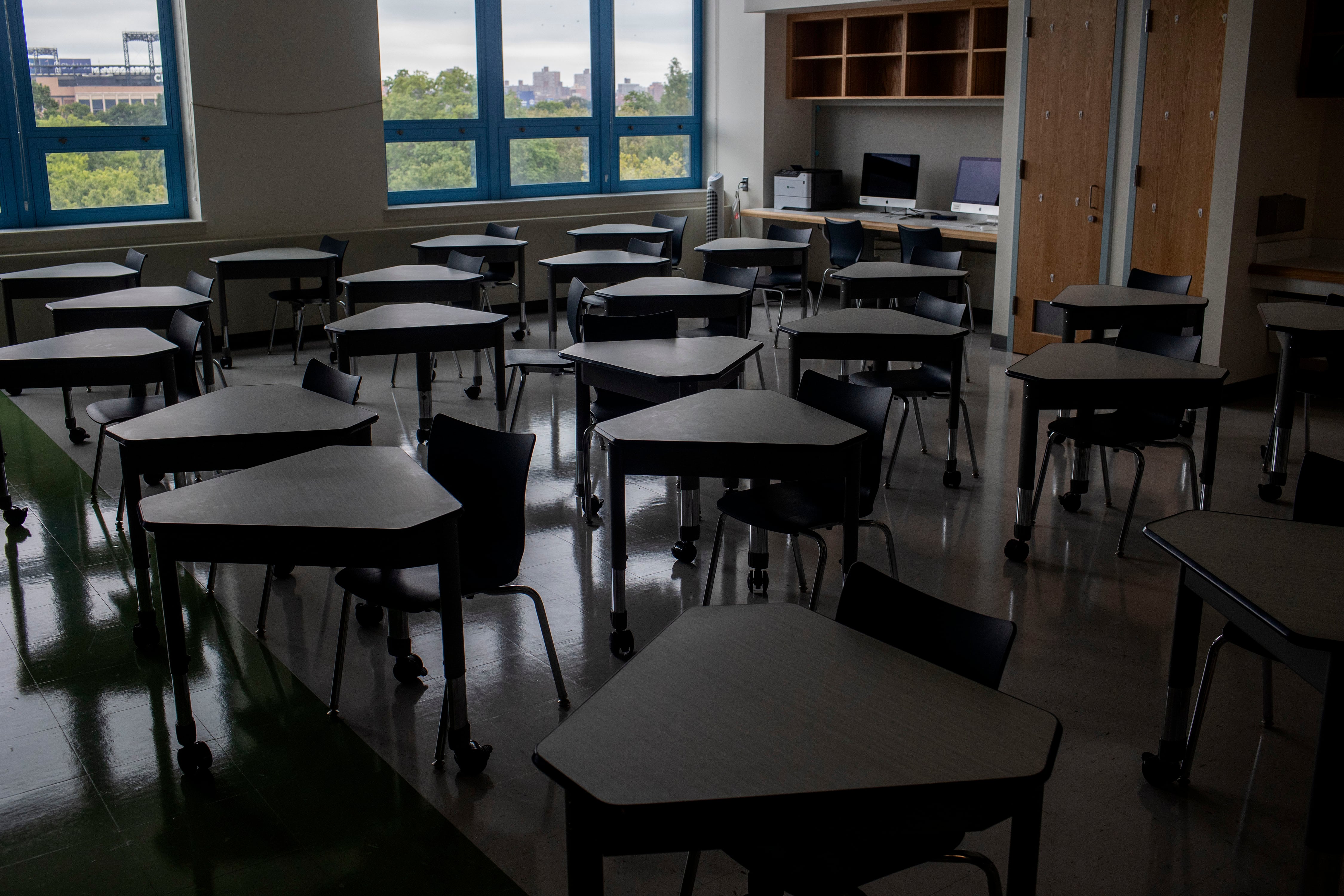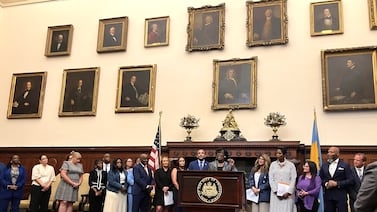Sign up for Chalkbeat Detroit’s free daily newsletter to keep up with the city’s public school system and Michigan education policy.
Michigan education officials this month asked the U.S. Department of Education to dismiss all claims that the state violated the federal rights of students with disabilities during COVID-era school shutdowns.
The state’s legal filing comes after an investigation by the federal department’s Office of Civil Rights found many students with disabilities did not receive the services and instruction they were entitled to under federal anti-discrimination laws.
The OCR found that children in Michigan’s public schools went prolonged periods without appropriate instruction or services, such as speech and language pathology, and still have not received mandated compensatory services, or additional assistance to help students catch up.
“I watched children with, in some cases, multiple severe cognitive impairments with no access to computers or instruction,” said Marcie Lipsitt, a Michigan special education advocate who filed the complaint with the OCR in March 2021.
The Michigan Department of Education, however, denied any wrongdoing alleged in the investigation, including that the agency “exacerbated and contributed to the harm to students with disabilities” by giving school districts incorrect information about the steps they were legally required to make when school buildings were closed.
The complaint seeks compensatory services for all 215,000 students in the state with individualized education programs, or IEPs, as well as all students with 504 plans, Lipsitt said. An IEP outlines services students with disabilities are entitled to, while 504 plans spell out accommodations for students who do not require special education services. (The number of students statewide with 504 plans wasn’t available, she said.)
Many districts in Michigan and across the nation struggled to provide services to students with disabilities during the pandemic, including physical therapy, speech therapy, and counseling. And districts all over the country faltered in identifying children with disabilities due to backlogs of evaluations.
Many parents said they were effectively on their own at home when it came to trying to meet their children’s educational needs.
When students returned in person, Michigan schools also had a difficult time filling roles that were essential to kids in special education and students with disabilities, like paraprofessionals, nurses, and social workers.
Even before COVID, Michigan has struggled to improve the quality of special education programs in public schools. The Department of Education previously found during the 2016-17 school year that Michigan needed intervention in meeting IDEA requirements.
The MDE was required to respond to all allegations within 20 days of the OCR’s filing of a 25-page “Notice of Opportunity for Hearing.” The state agency declined to answer further questions about the OCR’s findings.
“Due to the ongoing proceeding, the Michigan Department of Education has nothing more to add to the detailed documents we filed,” said Bob Wheaton, director of the office of public and governmental affairs for the department, in an email. “The department is strongly committed to providing equal access to educational opportunities to all students in Michigan – including students with disabilities.”
The MDE got a letter from the OCR in October, asking it to take corrective actions. It has been aware of the investigation since June, according to the OCR.
“To date, MDE has refused to enter into a resolution agreement and has failed to achieve compliance by voluntary means,” the OCR document reads, adding that the agency has determined it “cannot be achieved by voluntary means.”
In the investigation, federal education officials said they found:
- The MDE knew districts were failing to provide services to students with IEPs and 504 plans. Parents told the state agency their children were being denied needed services during shutdowns, and they asked for help.
- Staff at the MDE were notified about calls from parents about their children’s IEPs not being met. The supervisor of the agency’s Office of Special Education said in an email the issue was “trickling down into larger needs” and that it needed to be addressed.
- The state agency also “repeatedly” gave incorrect information in materials and during virtual sessions with parents, the OCR found, including falsely stating that compensatory services could only be attained through due process, a lengthy and often expensive legal proceeding for parents to resolve disputes with school districts.
- The OCR also found fault with the guidance the MDE gave to districts, which failed to explain that students can receive compensatory education without district error or neglect, and that it can be given during regular school hours.
- The state agency gave incorrect information about legal obligations to provide services when schools and districts reached out for guidance.
- The Michigan School for the Deaf, which is operated by the MDE, reduced its instructional time during the 2020-21 school year by 43%, according to the OCR, and that time has not been made up. It also didn’t provide speech language pathology, social work, or visual impairment consultation services to students for prolonged periods in violation of students’ IEPs, according to the OCR, and did not provide adequate compensatory services.
- The MDE did not designate a 504 coordinator or did not notify stakeholders of who the coordinator is and still has not done so.
In their response, state education officials denied most of the OCR’s allegations. The MDE’s response did admit to wording in the emails referenced in the report and some of the language used in its guidance for parents.
Some of the responses in the MDE filing appeared to be confusing or potentially contradictory.
For example, state officials admitted to using language about the process for receiving compensatory services that the OCR said was incorrect. However, the MDE denied the allegation that the agency gave out false information about compensatory services.
In another instance, the MDE acknowledged that the School for the Deaf didn’t employ a speech language pathologist from January 2021 until May 2022 and that students were owed more than 520 hours of compensatory services. But state officials denied the allegation that the hours were never made up for.
A spokesperson declined to answer further questions about the response.
Top state education official disagreed with OCR findings
During a meeting in June, two state Board of Education members asked State Superintendent Michael Rice why the MDE had refused to comply with the corrective actions the OCR had asked the agency to make.
Rice responded that it was a “pending legal matter.”
“We will be responding to the allegations of the OCR,” said Rice. “We do not agree with them.”
Tom McMillin, a Republican member of the at-large board who pressed Rice to talk about the complaint publicly, said the state “dropped the ball.”
“A lot of these kids have aged out and graduated,” he said. “That’s a travesty.”
Lipsitt, the advocate who filed the complaint, said she doesn’t think there is any way to really make up for what Michigan kids with IEPs and 504 plans missed out on during COVID shutdowns.
“But, I think the state can … give them the opportunity to build and learn the skills they didn’t have the opportunity to build and learn because of school closures,” she said.
An OCR response to MDE’s filing is expected in the coming weeks.
Hannah Dellinger covers K-12 education and state education policy for Chalkbeat Detroit. You can reach her at hdellinger@chalkbeat.org.







